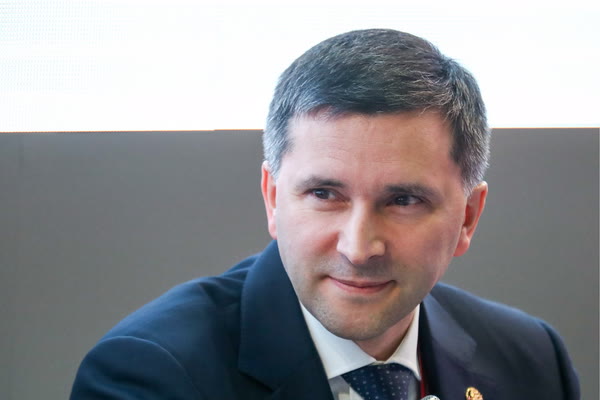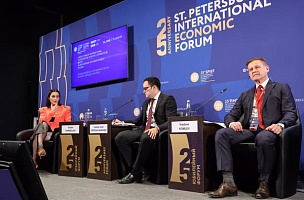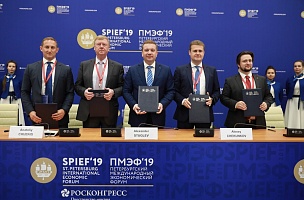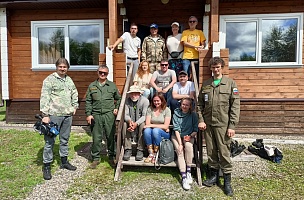KEY CONCLUSIONS
The waste management programme has moved to the practical implementation stage
“As for waste, from 1 January, reforms began in the Russian Federation, affecting more than 80 regions <…> In the near future, a legal entity under public law will be formed <…> this is not a supervisory body, but an integrator company <…> which will accompany this complex reform, and help all regional operators <…> it will include both federal funds and environmental fees,” Dmitry Kobylkin, Minister of Natural Resources and Environment of the Russian Federation.
“By 1 July, we must approve regional programmes for each region,” Maxim Egorov, Deputy Minister of Construction, Housing, and Utilities of the Russian Federation.
The regions are actively involved in implementing the Environment National Project
“We learn good practices from the regions of the Russian Federation, and we will analyze and replicate them. I am sure that we will cope with the tasks we have set,” Dmitry Kobylkin, Minister of Natural Resources and Environment of the Russian Federation.
“The secret of success <...> is that we have taken a unified position with the Government of the Russian Federation <...> The Government has supported us at every stage, and now <...> in the National Project <...> ‘Clean Country’ these projects [eliminating accumulated environmental damage - Ed.] are essentially flagship ones,” Gleb Nikitin, Governor of Nizhny Novgorod Region.
“Our republic participates in <...> the ‘Clean Volga’ programme to clean up the Volga <...> In addition, there is a regional programme in our republic <...> Every year municipal funds are invested in this programme,” Alexander Shadrikov, Minister of Ecology and Natural Resources of the Republic of Tatarstan.
The environment and the economy are inextricably linked
“We must <...> think about what the next generations will inherit. For that reason, the environment and economy are now inextricably linked,” Viktor Evtukhov, State Secretary – Deputy Minister of Industry and Trade of the Russian Federation.
PROBLEMS
Tight deadlines for implementing the Environment National Project
“Almost 100% of Russians will have to secure clean water over the next 5 years,” Maria Morgun, Chief Editor, Live Planet TV.
“Europe has been introducing the best available technologies for 20 years, while we plan to do so in 5 years,” Igor Nechaev, General Director, MCC EuroChem.
Transition to the best available technology requires major investment
“Investments need to be made, modernization and technological re-equipment <...> this will require a large amount of investment <...> this means trillions of roubles,” Viktor Evtukhov, State Secretary – Deputy Minister of Industry and Trade of the Russian Federation.
Absence of targeted programmes in a number of regions
“Often in the regions we do not have programmes <...> in many municipalities there are none of the indicators that are needed for water quality,” Maxim Egorov, Deputy Minister of Construction, Housing, and Utilities of the Russian Federation.
Tariff and regulatory imperfection
“It is very hard to do business during an undergoing reform <...>. We have problems with tariffs, with regulations. Regional authorities do not always set them up properly,” Ruslan Gubaydullin, Executive Director, Association Clean Country.
“Today, the sector that deals with household waste is adjusted to social expectations to the maximum possible level, tariffs are constrained from above,” Dmitriy Shkolniy, President, National environmental operator.
“At the present time, the relationship between the ‘producers’ of waste and those who process is not regulated <…> The ‘creator’ of the waste may <...> sell it as a commodity, as a secondary material resource. Therefore the negative impact on the environment will not change,” Marat Galiev, General Director of Yashel Park Siberia.
SOLUTIONS
Replicating successful practices
“The projects <...> for eliminating accumulated environmental damage <...> are unique, and each needs to develop a special technology <...> Now <...> we can offer other regions the use of <...> technologies and equipment created during the project’s implementation,” Gleb Nikitin, Governor of Nizhny Novgorod Region.
Using public-private partnerships
“In the regions where there is a normal tariff base, where the public-private partnership methods <...> are already working, we will continue this work,” Maxim Egorov, Deputy Minister of Construction, Housing, and Utilities of the Russian Federation.
Statutory regulation of companies’ emissions
“The bill that is currently under way <...> according to the total assessment of the impact on the atmosphere, when each company must throw out so much that it is one MAC [maximum allowable concentration-Ed.] for one person, and not a MAC from each company,” Anna Popova, Head, Federal Service for Surveillance on Consumer Rights Protection and Human Wellbeing.
“The state, the federal territories and more than 55 industrial companies are involved in the ‘Clean Air’ project <...> Today, the Ministry of Natural Resources and the Ministry of Science determine <...> the methodology of [summary calculations - Ed.] <...> We have identified 12 ‘polluter cities’ <...> Comprehensive plans are being signed <...> that define the steps that we will be taking," Svetlana Radionova, Head, Federal Supervisory Natural Resources Management Service.
Development of environmental standards for waste disposal
“In today's documents there is no standardization for the separate export of [waste] <...> therefore we <...> have addressed the issue of giving our chief state health inspectors in the regions <...> the power to regulate this problematic issue. This will be decided on a regional level,” Anna Popova, Head, Federal Service for Surveillance on Consumer Rights Protection and Human Wellbeing.
State support for environmental projects
“We have measures of state support in place <...> These are the Industrial Development Fund, subsidies, pilot production batches, and many others,” Viktor Evtukhov, State Secretary – Deputy Minister of Industry and Trade of the Russian Federation.
"On the eve of the Year of the Environment, we have signed an agreement <...> to complete the modernization of production <...> Today, the company's emissions have decreased by almost 20 times <...> Last year, we signed an agreement with the Ministry of Environment and Chelyabinsk Region to clean up accumulated environmental damage,” Natalia Gonchar, Vice President for Environmental Health and Safety (EHS), Russian Copper Company.
“At this investment forum, we want <...> to sign an agreement with one of our country's regions, which will help us to add housing and public utilities <...> schools and offices to the retail network,” Yuriy Korotaev, General Director, Duracell Russia.






